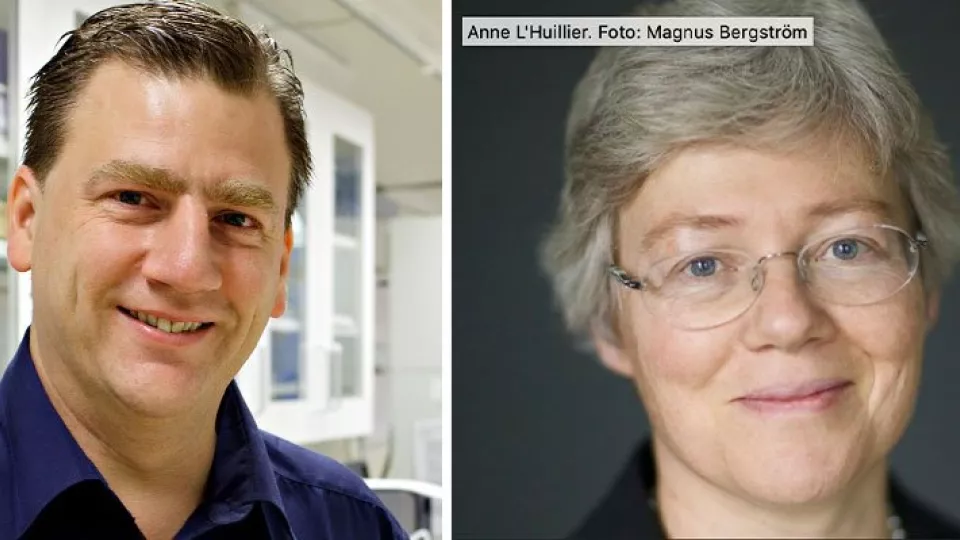In her research, Anne L'Huillier uses laser technology to create ultra-short light pulses, which make it possible to look into the microcosmos. The pulses are incredibly short: an attosecond is one billionth of a billionth of one second. With these “camera flashes” it is possible to study the motion of electrons within atoms and molecules. Her research team carries out experiments that provide a new basic understanding of the dynamics inside atoms, for example, when an atom is ionised.
With the grant from the ERC, Anne L’Huillier has the possibility to take a step in a new direction – deeper into the world of quantum mechanics.
“In fundamental quantum physics, experiments are most often carried out using individual photons or ions. We will instead use short electron ‘wave packets’, created by laser-based attosecond pulses”, she says.
In quantum mechanics, an electron is both a particle and a wave. The researchers plan to create electron waves in a controlled way and study how well and for how long they can be made to interfere with each other. Also, entangled electron pairs will be created via double ionisation and studied.
“I am very pleased. It is a very, very nice feeling to be awarded this grant. It will be both demanding and exciting”, says Anne L’Huillier.
The grant of EUR 2.5 million for a five-year period will be used to employ doctoral students and postdocs and to buy laser equipment. It is the third time that Anne L’Huillier has received an ERC Advanced Grant.
Olle Melander, Professor of Internal Medicine, does research on new preventive treatments for diabetes and cardiovascular disease.
“It feels incredibly inspiring that the European Research Council has in this way awarded the highest grade to our research, and shows that we are in the very highest echelons in life science in Europe. Receiving this grant has great significance for our research. It enables intervention studies that are expensive, but extremely important for the field, over the next five years.”
Olle Melander has previously had an ERC Starting Grant 2012–2016. He received the ERC Advanced Grant for the project “PREVENT-2024: Moving from biomarkers to mechanism-oriented prevention of cardiometabolic disease”.
In previous research, Olle Melander demonstrated that several different hormonal disruptions, for example of the hormones vasopressin, neurotensin and adrenomedullin, are linked to a considerably increased risk of diabetes and cardiovascular disease.
The funding from the European Research Council will be used primarily to strengthen research on personalised treatment measures to normalise these hormone disruptions. As the hormonal causes of diabetes and cardiovascular disease vary from individual to individual, the researchers first chart which hormone systems are overactive in different individuals and then initiate personalised treatments. By combining specific lifestyle measures and new drugs, the researchers normalise the individual’s hormone disruptions with an aim to reduce the risk of diabetes and cardiovascular disease.
By personalising the preventive treatments, Olle Melander hopes that the “PREVENT‑2024” project will be able to counteract diabetes and cardiovascular disease on a broad front. He considers that the top-class clinical research infrastructures at Lund University and Skåne University Hospital provide unique conditions for succeeding with this type of translational research.
“Thanks to the proximity between academia and healthcare, we have good possibilities to implement our results clinically in the near future, so that they can benefit patients and all citizens. In the long term, I hope that the new concept of personalised and preventive treatment that we are testing in this project will lead to a substantial reduction in the number of people developing type 2 diabetes and cardiovascular disease”, says Olle Melander.
The President of the European Research Council (ERC), Professor Mauro Ferrari, commented: “I am glad to announce a new round of ERC grants that will back cutting-edge, exploratory research, set to help Europe and the world to be better equipped for what the future may hold. That’s the role of blue sky research. These senior research stars will cut new ground in a broad range of fields, including the area of health. I wish them all the best in this endeavour and, at this time of crisis, let me pay tribute to the heroic and invaluable work of the scientific community as a whole.”
He added: “In this grant competition, we noted a drop in number of UK-based grantees, which reflects the recent decline in applications from the UK. Collaboration is one of the biggest gifts we have in science and I am hoping for the best for our future relationship with the UK.”
Two ERC Advanced Grants awarded to Lund University researchers

Two Lund researchers have received the prestigious European Research Council’s (ERC) Advanced Grant of approximately SEK 25 million each: Anne L’Huillier, professor of Atomic Physics and Olle Melander, professor of Internal Medicine and consultant at Skåne University Hospital. The grants are for research on atomic physics and quantum mechanics, and diabetes and cardiovascular disease respectively.